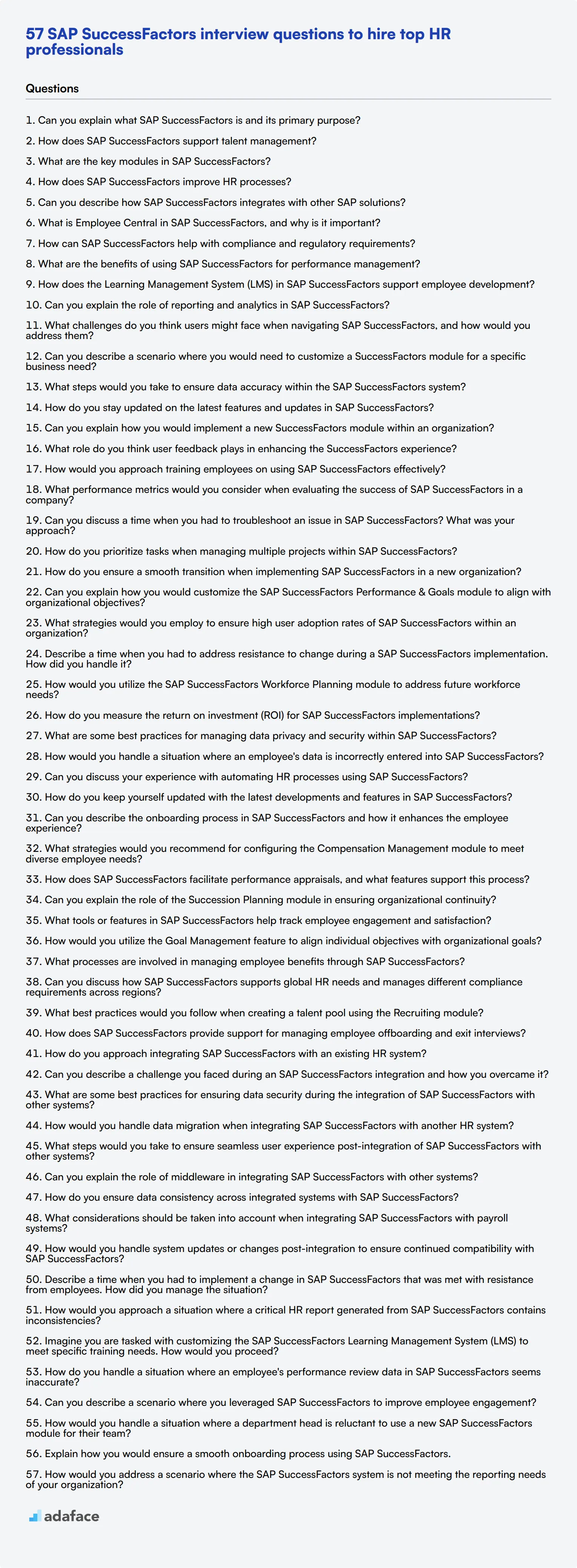Interviewing candidates for SAP SuccessFactors roles requires knowing the right questions to gauge their proficiency and suitability. By focusing on specific areas, you can ensure you’re hiring someone capable of navigating the platform and its various functionalities.
This blog post compiles structured interview questions tailored for different HR professional tiers. Whether you're interviewing junior associates or seasoned experts, these questions will help you assess their knowledge and skills effectively.
Using these targeted questions can streamline your interview process and increase the chances of hiring the right candidate. Additionally, complementing this approach with an SAP SuccessFactors skills test can help you further identify the strongest candidates before diving into interviews.
Table of contents
10 basic SAP SuccessFactors interview questions and answers to assess applicants
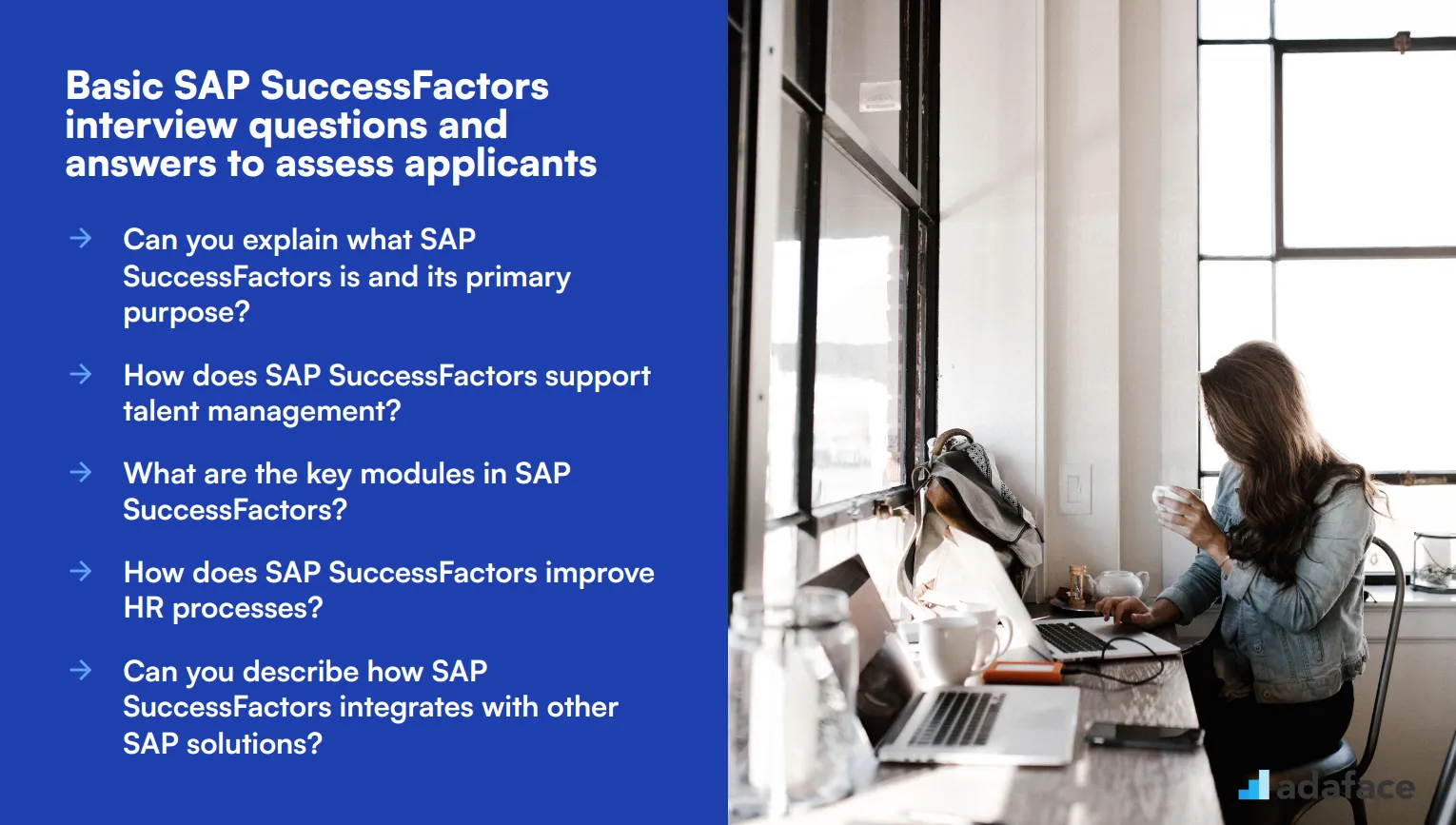
To determine whether your applicants have the right understanding and skills to work with SAP SuccessFactors, ask them some of these fundamental interview questions. This list is designed to help you evaluate their core knowledge and assess if they're the right fit for your team.
1. Can you explain what SAP SuccessFactors is and its primary purpose?
SAP SuccessFactors is a cloud-based Human Capital Management (HCM) solution that helps organizations manage various HR functions such as recruitment, onboarding, performance management, and learning and development. Its primary purpose is to streamline HR processes and enhance employee engagement through data-driven insights.
An ideal candidate should clearly explain that SuccessFactors is an integrated solution that supports HR and talent management needs. Look for candidates who can discuss its benefits, such as scalability, ease of use, and comprehensive HR functionalities.
2. How does SAP SuccessFactors support talent management?
SAP SuccessFactors offers a suite of tools to manage the entire talent lifecycle, including recruiting, onboarding, performance & goals management, compensation, and succession planning. These tools help organizations attract, retain, and develop talent efficiently.
Candidates should mention specific modules like Recruiting Management, Performance & Goals, and Learning Management. Look for a clear understanding of how these modules interact to provide a seamless talent management experience.
3. What are the key modules in SAP SuccessFactors?
Key modules in SAP SuccessFactors include Employee Central, Recruiting Management, Onboarding, Performance & Goals, Learning Management, Compensation, and Succession & Development.
Strong candidates will not only list these modules but also briefly describe their functionalities. Look for someone who can articulate how each module serves a specific HR need and integrates with others to form a cohesive system.
4. How does SAP SuccessFactors improve HR processes?
SAP SuccessFactors improves HR processes by automating routine tasks, providing real-time analytics, and offering self-service options for employees. This leads to increased efficiency, better decision-making, and enhanced employee engagement.
Look for candidates who can provide specific examples of process improvements, such as reduced time-to-hire or improved performance review cycles. Their answers should reflect a practical understanding of the system's impact on HR operations.
5. Can you describe how SAP SuccessFactors integrates with other SAP solutions?
SAP SuccessFactors integrates seamlessly with other SAP solutions like SAP ERP, SAP S/4HANA, and SAP Analytics Cloud through APIs and middleware such as SAP Cloud Platform Integration. This integration ensures data consistency and allows for comprehensive reporting and analytics.
Candidates should highlight the importance of integration for unified data management and operational efficiency. Look for answers that mention specific integration benefits, such as improved data accuracy and holistic business insights.
6. What is Employee Central in SAP SuccessFactors, and why is it important?
Employee Central is the core HR module in SAP SuccessFactors, acting as a central repository for employee data and enabling core HR processes. It supports organizational management, employee records, and HR transactions.
An ideal response should emphasize the importance of Employee Central in providing a unified view of the workforce, ensuring data accuracy, and supporting compliance. Candidates should also mention its role in integrating with other SuccessFactors modules.
7. How can SAP SuccessFactors help with compliance and regulatory requirements?
SAP SuccessFactors helps organizations stay compliant with regulatory requirements by providing features like automated data capture, audit trails, and compliance reporting. It also supports localization for various countries' legal and regulatory standards.
Candidates should discuss specific features that aid in compliance, such as configurable workflows and audit capabilities. Look for an understanding of how these features reduce risks and ensure adherence to regulations.
8. What are the benefits of using SAP SuccessFactors for performance management?
SAP SuccessFactors Performance & Goals module helps organizations set clear objectives, track employee performance, and provide continuous feedback. This leads to improved employee engagement, better alignment with organizational goals, and enhanced productivity.
A strong candidate will mention benefits such as goal alignment, real-time feedback, and data-driven performance reviews. Look for practical examples of how these features can positively impact employee performance and organizational success.
9. How does the Learning Management System (LMS) in SAP SuccessFactors support employee development?
The LMS in SAP SuccessFactors provides a platform for managing and delivering training programs, tracking learning progress, and assessing skill development. It supports various learning formats, including online courses, classroom training, and social learning.
Candidates should highlight the importance of continuous learning and development in maintaining a skilled workforce. Look for an understanding of how the LMS can be used to address skill gaps and promote career growth.
10. Can you explain the role of reporting and analytics in SAP SuccessFactors?
Reporting and analytics in SAP SuccessFactors provide HR professionals with insights into workforce data, enabling better decision-making and strategic planning. The platform offers pre-built reports, customizable dashboards, and advanced analytics capabilities.
Ideal candidates will discuss the importance of data-driven decision-making and how analytics can identify trends, measure HR metrics, and support business objectives. Look for examples of how reporting can be used to improve HR processes and outcomes.
10 SAP SuccessFactors interview questions to ask junior HR professionals
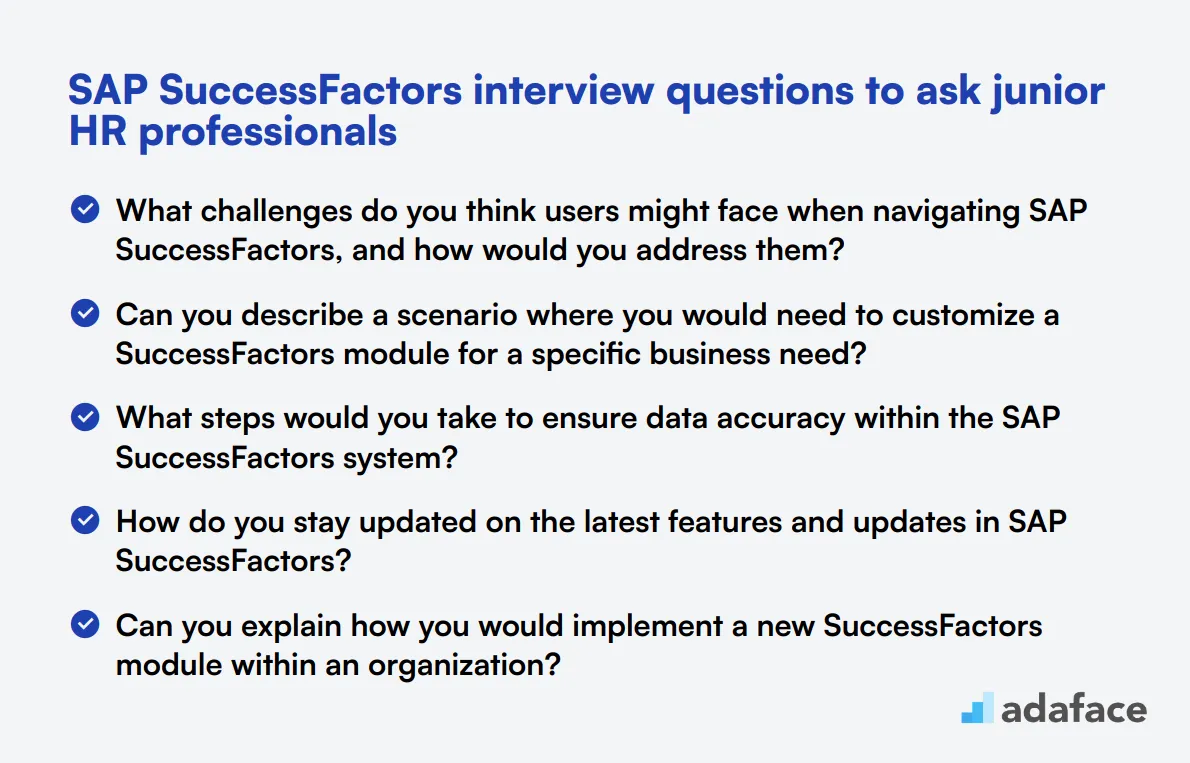
When interviewing junior HR professionals, asking the right questions can reveal their understanding of SAP SuccessFactors and its functionalities. Use these questions to gauge their knowledge and practical skills, ensuring they align with your organization's needs. For more specific roles, check out our detailed job descriptions.
- What challenges do you think users might face when navigating SAP SuccessFactors, and how would you address them?
- Can you describe a scenario where you would need to customize a SuccessFactors module for a specific business need?
- What steps would you take to ensure data accuracy within the SAP SuccessFactors system?
- How do you stay updated on the latest features and updates in SAP SuccessFactors?
- Can you explain how you would implement a new SuccessFactors module within an organization?
- What role do you think user feedback plays in enhancing the SuccessFactors experience?
- How would you approach training employees on using SAP SuccessFactors effectively?
- What performance metrics would you consider when evaluating the success of SAP SuccessFactors in a company?
- Can you discuss a time when you had to troubleshoot an issue in SAP SuccessFactors? What was your approach?
- How do you prioritize tasks when managing multiple projects within SAP SuccessFactors?
10 intermediate SAP SuccessFactors interview questions and answers to ask mid-tier HR professionals
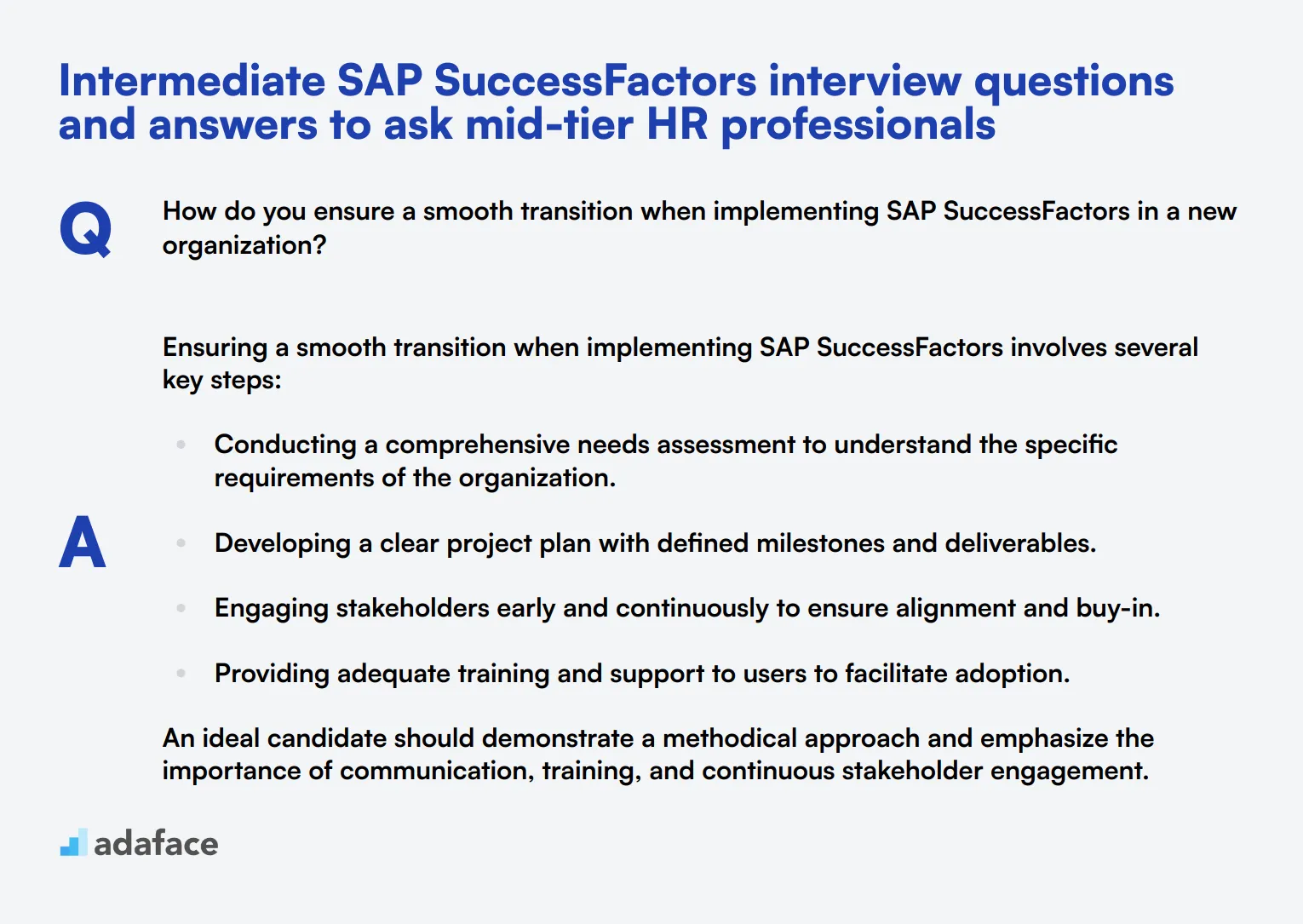
To gauge whether your mid-tier HR professionals have a solid understanding of SAP SuccessFactors, consider using these intermediate level interview questions. These questions are designed to explore their practical knowledge and ability to apply the platform's features effectively in real-world scenarios.
1. How do you ensure a smooth transition when implementing SAP SuccessFactors in a new organization?
Ensuring a smooth transition when implementing SAP SuccessFactors involves several key steps:
- Conducting a comprehensive needs assessment to understand the specific requirements of the organization.
- Developing a clear project plan with defined milestones and deliverables.
- Engaging stakeholders early and continuously to ensure alignment and buy-in.
- Providing adequate training and support to users to facilitate adoption.
An ideal candidate should demonstrate a methodical approach and emphasize the importance of communication, training, and continuous stakeholder engagement.
2. Can you explain how you would customize the SAP SuccessFactors Performance & Goals module to align with organizational objectives?
To customize the SAP SuccessFactors Performance & Goals module, I would:
- Align goal-setting templates with the organization's strategic objectives to ensure each employee’s goals contribute to overall business goals.
- Configure performance review forms to match the organization's performance criteria and competencies.
- Set up automated reminders and workflows to support timely completion of performance reviews.
- Customize reports and dashboards to provide insights into performance trends and areas for improvement.
Look for candidates who can clearly articulate how each customization supports the broader organizational objectives and enhances performance management.
3. What strategies would you employ to ensure high user adoption rates of SAP SuccessFactors within an organization?
To ensure high user adoption rates, I would employ several strategies:
- Conducting extensive user training sessions tailored to different user groups.
- Creating user-friendly guides and resources to facilitate ease of use.
- Setting up a support system to assist users with any issues or questions they may have.
- Gathering user feedback regularly and making necessary adjustments to improve the system.
Ideal responses should emphasize the importance of continuous support and feedback loops, as well as tailoring training to user needs.
4. Describe a time when you had to address resistance to change during a SAP SuccessFactors implementation. How did you handle it?
When addressing resistance to change during an implementation, it's crucial to understand the root cause of the resistance. In my experience:
- I start by engaging with the resistant individuals or groups to understand their concerns.
- I provide clear communication about the benefits of the change and how it aligns with organizational goals.
- I involve them in the implementation process to give them a sense of ownership and control.
- I offer additional training and support to address any skill gaps or fears.
Candidates should demonstrate empathy, communication skills, and a proactive approach to managing resistance.
5. How would you utilize the SAP SuccessFactors Workforce Planning module to address future workforce needs?
Utilizing the Workforce Planning module involves:
- Analyzing current workforce data to identify trends and gaps.
- Forecasting future workforce needs based on business growth and strategic goals.
- Developing actionable plans to address identified gaps, such as recruitment strategies or development programs.
- Continuously monitoring and adjusting the plan as needed to ensure alignment with changing business needs.
A strong candidate answer should include a detailed approach to data analysis and planning, emphasizing adaptability and strategic alignment.
6. How do you measure the return on investment (ROI) for SAP SuccessFactors implementations?
Measuring ROI involves:
- Identifying key performance indicators (KPIs) that align with the objectives of the implementation, such as productivity gains, employee engagement scores, and cost savings.
- Collecting baseline data before the implementation to compare against post-implementation results.
- Analyzing the data to assess improvements and quantifying the financial impact of these improvements.
- Reporting the findings to stakeholders and using the insights to inform future investments.
Candidates should be able to explain their methodology for measuring ROI and provide examples of KPIs they have used successfully in the past.
7. What are some best practices for managing data privacy and security within SAP SuccessFactors?
Best practices for managing data privacy and security include:
- Implementing role-based access controls to ensure that only authorized personnel can access sensitive information.
- Regularly auditing and monitoring access logs to detect and respond to any unauthorized access.
- Ensuring data encryption during transmission and storage.
- Keeping the system up-to-date with the latest security patches and updates.
Look for candidates who can provide specific examples of how they have implemented these practices and the outcomes they achieved.
8. How would you handle a situation where an employee's data is incorrectly entered into SAP SuccessFactors?
Handling incorrect data entry involves:
- Identifying and verifying the incorrect data.
- Correcting the data in the system and ensuring consistency across all related records.
- Investigating the root cause of the error to prevent future occurrences.
- Communicating the correction to relevant stakeholders and updating any impacted reports or processes.
Candidates should demonstrate attention to detail, problem-solving skills, and a systematic approach to data management.
9. Can you discuss your experience with automating HR processes using SAP SuccessFactors?
Automating HR processes using SAP SuccessFactors can greatly enhance efficiency and accuracy. In my experience:
- I have automated onboarding processes to ensure a seamless experience for new hires, including automated task assignments and reminders.
- I have set up workflows for performance reviews to streamline the approval and feedback process.
- I have utilized automation in payroll processing to reduce manual errors and ensure timely payments.
A good answer should include specific examples of automation projects the candidate has led and the impact on the organization's efficiency.
10. How do you keep yourself updated with the latest developments and features in SAP SuccessFactors?
Staying updated with SAP SuccessFactors developments involves:
- Regularly participating in SAP webinars, conferences, and training sessions.
- Engaging with the SAP community through forums and user groups.
- Subscribing to relevant newsletters and following SAP blogs and official announcements.
- Experimenting with new features in a sandbox environment before deploying them in the live system.
Look for candidates who show a proactive approach to continuous learning and who can provide examples of how they have applied new knowledge to improve their work.
10 SAP SuccessFactors interview questions about processes and functionalities
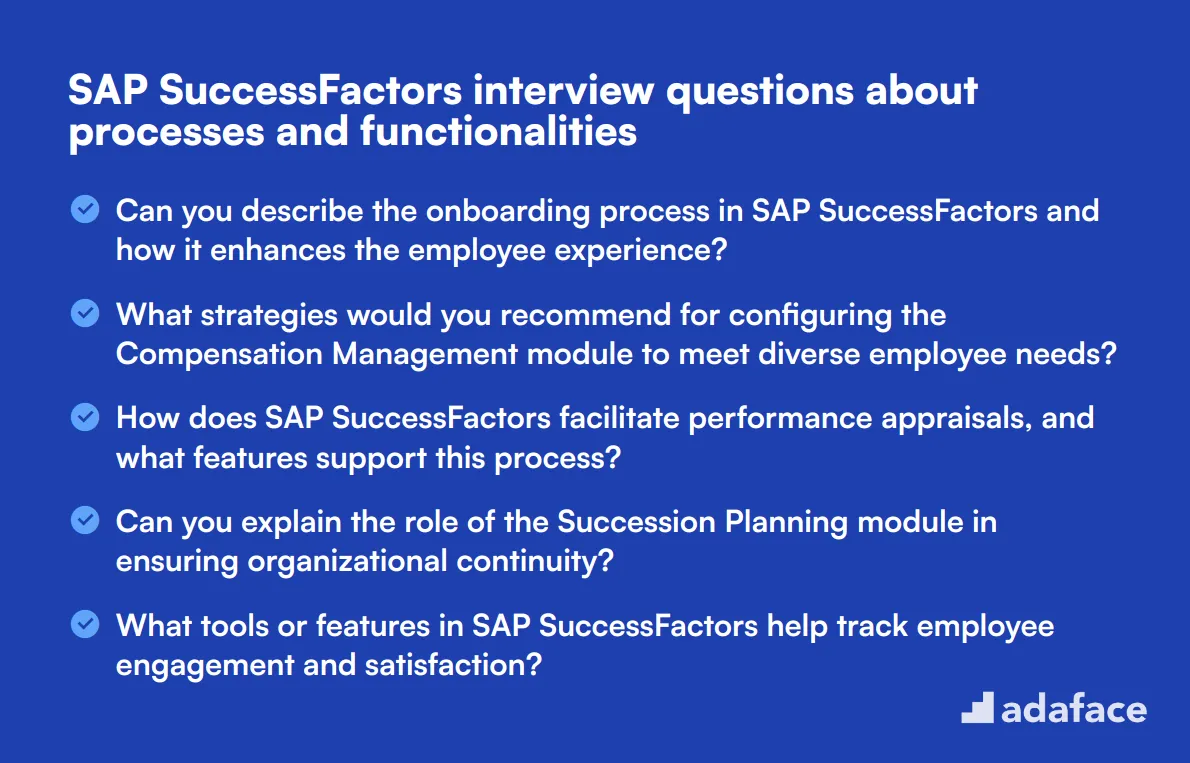
To assess a candidate's grasp of SAP SuccessFactors processes and functionalities, these targeted interview questions can be invaluable. Use this list to guide your discussions and gain insights into how well applicants understand the practical applications of the system, especially when hiring for roles like HR Coordinator or SAP Functional Consultant.
- Can you describe the onboarding process in SAP SuccessFactors and how it enhances the employee experience?
- What strategies would you recommend for configuring the Compensation Management module to meet diverse employee needs?
- How does SAP SuccessFactors facilitate performance appraisals, and what features support this process?
- Can you explain the role of the Succession Planning module in ensuring organizational continuity?
- What tools or features in SAP SuccessFactors help track employee engagement and satisfaction?
- How would you utilize the Goal Management feature to align individual objectives with organizational goals?
- What processes are involved in managing employee benefits through SAP SuccessFactors?
- Can you discuss how SAP SuccessFactors supports global HR needs and manages different compliance requirements across regions?
- What best practices would you follow when creating a talent pool using the Recruiting module?
- How does SAP SuccessFactors provide support for managing employee offboarding and exit interviews?
9 SAP SuccessFactors interview questions and answers related to integration with other systems
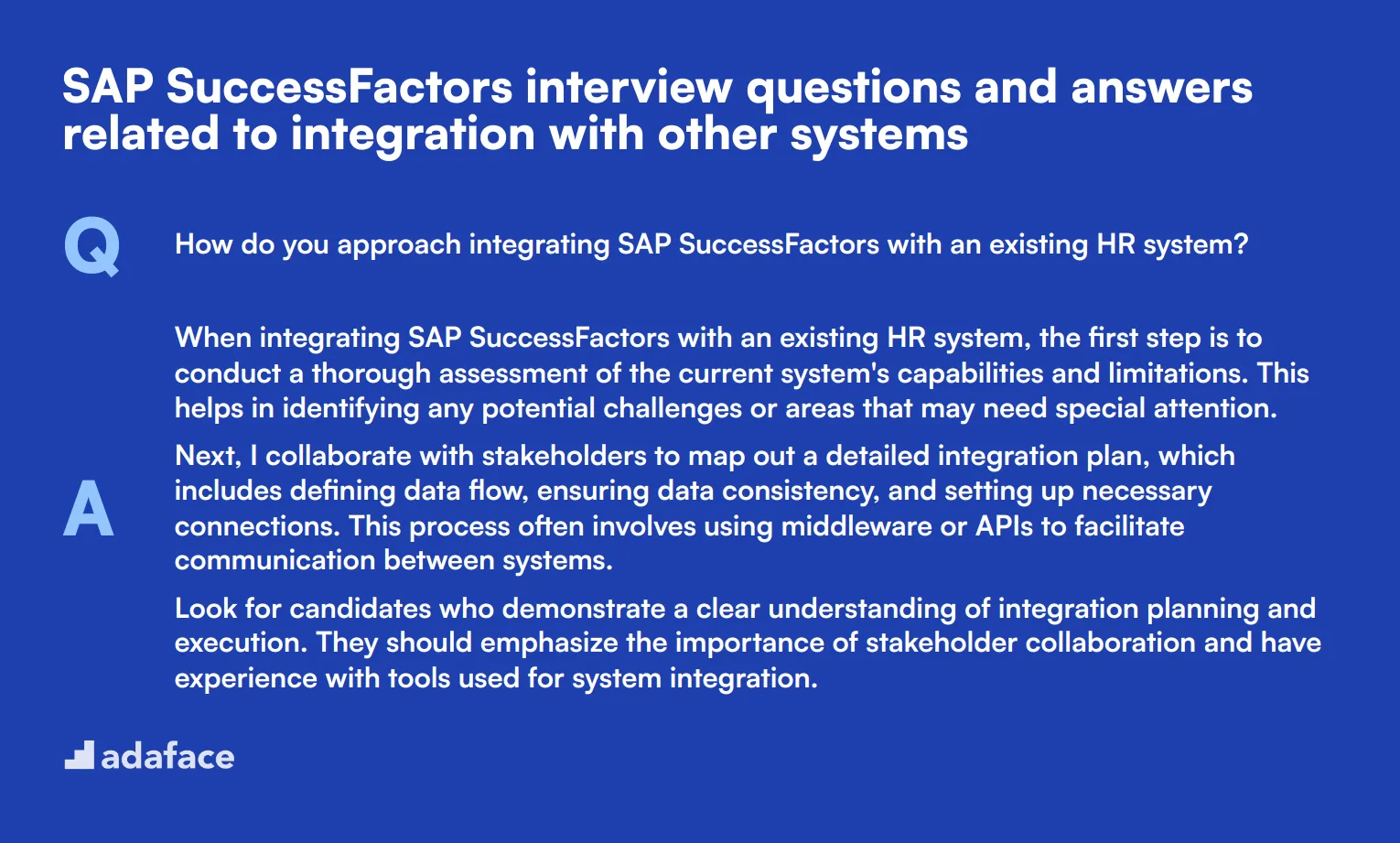
To evaluate whether your candidates can effectively integrate SAP SuccessFactors with other systems, use these interview questions. Understanding integration is crucial for ensuring seamless HR operations and data flow across platforms.
1. How do you approach integrating SAP SuccessFactors with an existing HR system?
When integrating SAP SuccessFactors with an existing HR system, the first step is to conduct a thorough assessment of the current system's capabilities and limitations. This helps in identifying any potential challenges or areas that may need special attention.
Next, I collaborate with stakeholders to map out a detailed integration plan, which includes defining data flow, ensuring data consistency, and setting up necessary connections. This process often involves using middleware or APIs to facilitate communication between systems.
Look for candidates who demonstrate a clear understanding of integration planning and execution. They should emphasize the importance of stakeholder collaboration and have experience with tools used for system integration.
2. Can you describe a challenge you faced during an SAP SuccessFactors integration and how you overcame it?
In a previous project, a significant challenge was ensuring data consistency between SAP SuccessFactors and a legacy HR system. Data discrepancies were causing issues with employee records and reporting.
To address this, I implemented a data validation process that included periodic audits and real-time data synchronization. This involved setting up automated scripts to cross-check data between systems and manually resolving any discrepancies.
Ideal candidates should highlight their problem-solving skills and ability to adapt. They should discuss specific steps taken to resolve the challenge and emphasize the importance of maintaining data integrity during integration.
3. What are some best practices for ensuring data security during the integration of SAP SuccessFactors with other systems?
Ensuring data security during integration involves several key practices. First, using secure communication protocols such as HTTPS for data transfer is essential. This ensures that data is encrypted and protected from unauthorized access.
Another critical practice is implementing role-based access control to restrict data access to authorized personnel only. Regular security audits and compliance checks are also necessary to identify and mitigate any potential vulnerabilities.
Recruiters should look for candidates who are well-versed in data security protocols and can demonstrate a proactive approach to safeguarding sensitive information. Emphasis on regular audits and compliance with security standards is a plus.
4. How would you handle data migration when integrating SAP SuccessFactors with another HR system?
Data migration is a crucial step in system integration. To handle this, I start by conducting a comprehensive data audit to understand the data structure and identify any inconsistencies or redundancies.
Next, I develop a detailed migration plan that includes data mapping, transformation rules, and a timeline. Using ETL (Extract, Transform, Load) tools, I ensure that data is accurately transferred and validated in the new system.
Candidates should be able to discuss their experience with data migration tools and processes. They should emphasize thorough planning and validation to ensure data integrity and minimize disruptions during the migration process.
5. What steps would you take to ensure seamless user experience post-integration of SAP SuccessFactors with other systems?
Post-integration, ensuring a seamless user experience involves several steps. First, conducting user training sessions to familiarize employees with the new system and its features is crucial.
Additionally, setting up a support system to address any user issues or questions promptly helps maintain productivity. Regular feedback collection and system performance monitoring allow for continuous improvements and quick resolution of any emerging issues.
Look for candidates who prioritize user training and support. They should mention feedback mechanisms and system monitoring as essential practices for maintaining a positive user experience post-integration.
6. Can you explain the role of middleware in integrating SAP SuccessFactors with other systems?
Middleware acts as a bridge between SAP SuccessFactors and other systems, facilitating data exchange and communication. It helps in translating data formats and protocols between different systems, ensuring seamless integration.
Using middleware simplifies the integration process by managing data flow, handling errors, and providing a centralized platform for monitoring integration tasks. This reduces the complexity and potential issues associated with direct system-to-system integration.
Candidates should demonstrate an understanding of middleware's role in integration. They should be able to discuss its benefits and give examples of middleware solutions they have used in past projects.
7. How do you ensure data consistency across integrated systems with SAP SuccessFactors?
Ensuring data consistency involves setting up robust data validation and synchronization processes. This includes regular data audits, real-time data syncing, and implementing automated scripts to check for discrepancies.
Using integration tools that support data mapping and transformation helps maintain consistency by ensuring that data from different systems align correctly. Additionally, establishing clear data governance policies and protocols is crucial.
Candidates should highlight their experience with data validation and synchronization tools. They should emphasize the importance of automated processes and strong data governance in maintaining data consistency.
8. What considerations should be taken into account when integrating SAP SuccessFactors with payroll systems?
When integrating SAP SuccessFactors with payroll systems, it is crucial to ensure accurate data transfer for payroll processing. This includes employee records, time and attendance data, and compensation details.
Additionally, compliance with local and international payroll regulations must be considered. Setting up secure data transfer protocols and regular reconciliation processes helps maintain accuracy and compliance.
Candidates should demonstrate an understanding of payroll integration challenges and solutions. They should discuss the importance of accuracy, compliance, and data security in the integration process.
9. How would you handle system updates or changes post-integration to ensure continued compatibility with SAP SuccessFactors?
Handling system updates post-integration involves regular monitoring and testing of the integrated systems. Establishing a change management process ensures that any updates or changes are thoroughly tested for compatibility before implementation.
It is also important to maintain documentation and communication with stakeholders to keep everyone informed about any changes. Regular system audits and performance checks help identify and resolve any issues promptly.
Candidates should highlight their experience with change management and system monitoring. They should emphasize the importance of testing, documentation, and stakeholder communication in maintaining system compatibility.
8 situational SAP SuccessFactors interview questions with answers for hiring top HR professionals
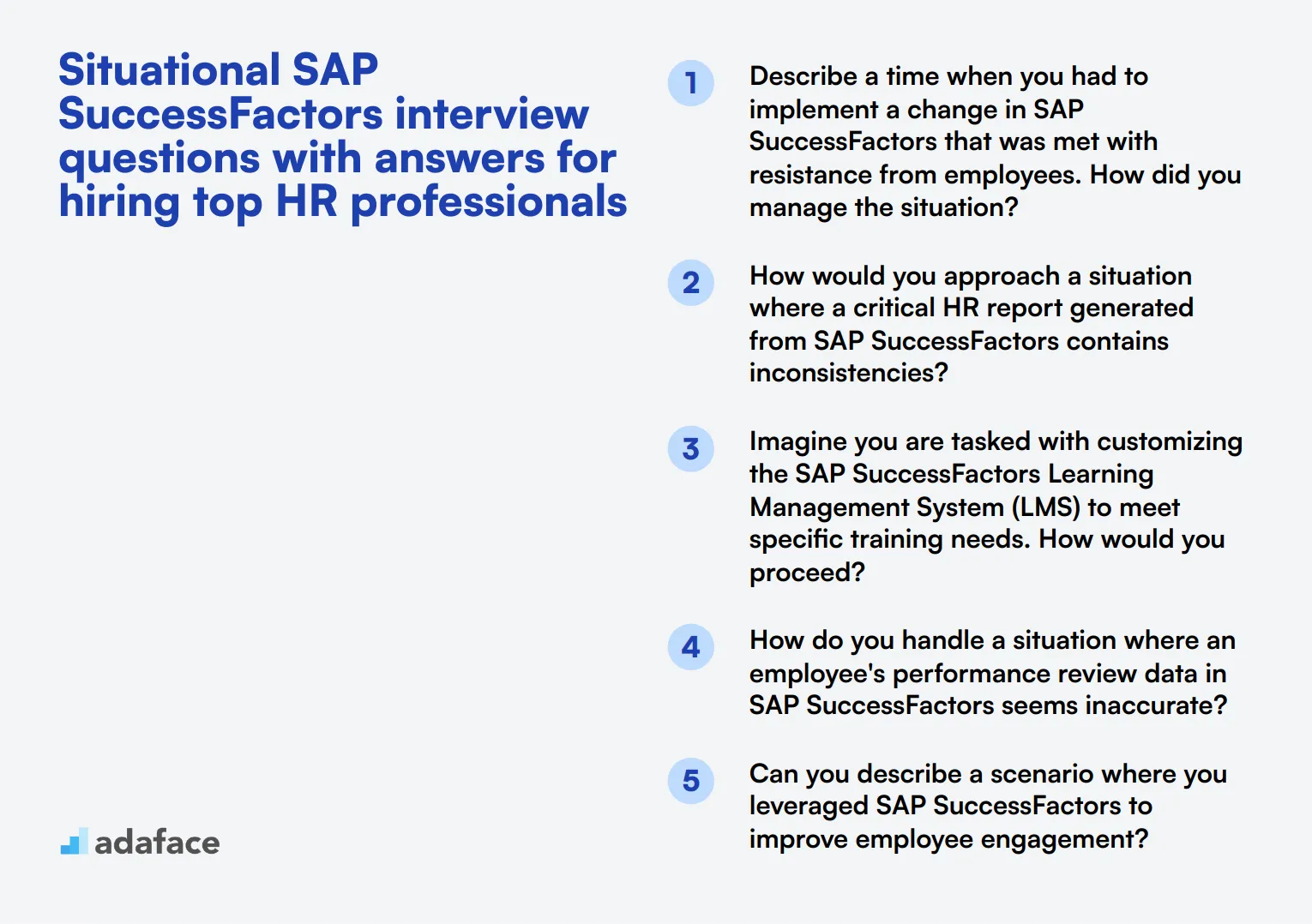
To uncover the practical know-how and decision-making skills of your candidates, these situational SAP SuccessFactors interview questions are your go-to. Use them during interviews to gauge how well applicants can handle real-world HR scenarios using SAP SuccessFactors.
1. Describe a time when you had to implement a change in SAP SuccessFactors that was met with resistance from employees. How did you manage the situation?
When facing resistance to change, it's crucial to communicate the benefits and necessity of the new implementation clearly. I once introduced a new performance management module in SAP SuccessFactors. Initially, employees were skeptical about its benefits.
To manage the situation, I organized multiple training sessions and Q&A forums to address concerns and demonstrate how the new module would streamline their tasks. Additionally, I gathered feedback to make minor tweaks that would improve user experience.
Look for candidates who can demonstrate their problem-solving and communication skills. They should emphasize the importance of empathy and active listening in managing resistance to change.
2. How would you approach a situation where a critical HR report generated from SAP SuccessFactors contains inconsistencies?
First, I would verify the data sources and parameters used for generating the report to pinpoint where inconsistencies might have arisen. This includes checking data entries, formulas, and the integration with other modules.
Next, I would collaborate with the IT team to troubleshoot any technical issues and ensure the data is accurately reflected. Lastly, I’d implement corrective measures and update the reporting process to prevent future inconsistencies.
Candidates should show their ability to systematically identify and address issues. Look for detailed steps in their troubleshooting process and their willingness to collaborate with other departments.
3. Imagine you are tasked with customizing the SAP SuccessFactors Learning Management System (LMS) to meet specific training needs. How would you proceed?
I would start by conducting a needs assessment to understand the specific training requirements and objectives. This involves gathering input from stakeholders and analyzing current training gaps.
With this information, I’d customize the LMS by setting up targeted learning paths, creating or uploading relevant training materials, and configuring assessments to track progress. Continuous feedback loops would be established to ensure the system evolves with training needs.
Ideal responses should include an emphasis on thorough needs assessment and stakeholder engagement. Candidates should highlight their experience in customizing LMS features and their focus on continuous improvement.
4. How do you handle a situation where an employee's performance review data in SAP SuccessFactors seems inaccurate?
I would first verify the data against other performance records to ensure it's not a data entry error. If inconsistencies are found, I would discuss them with the employee and their manager to understand the context.
If necessary, I’d correct the data in the system and ensure that future performance reviews are conducted with greater accuracy by providing additional training or refining the evaluation criteria.
Candidates should demonstrate attention to detail and a commitment to fairness and accuracy. Look for their ability to engage in constructive conversations and their solutions for preventing similar issues in the future.
5. Can you describe a scenario where you leveraged SAP SuccessFactors to improve employee engagement?
In one instance, I utilized the SAP SuccessFactors Employee Central and the Performance & Goals modules to create a transparent and engaging performance management system. By aligning individual goals with organizational objectives, employees felt more connected to the company's mission.
Additionally, I implemented regular check-ins and pulse surveys to gauge employee sentiment and address concerns promptly. This approach not only improved engagement but also boosted overall morale.
Look for candidates who can provide specific examples of how they've used SAP SuccessFactors to enhance engagement. They should highlight their strategic thinking and ability to align HR initiatives with business goals.
6. How would you handle a situation where a department head is reluctant to use a new SAP SuccessFactors module for their team?
I would approach the department head to understand their concerns and reservations about the new module. Open communication is key to identifying the root cause of their reluctance.
By demonstrating the module’s functionality and how it can address their specific challenges, I aim to build trust and show its value. Providing hands-on training and support can also help ease their transition.
Candidates should show their ability to build relationships and advocate for the benefits of new systems. Their answer should reflect a balance of technical knowledge and interpersonal skills.
7. Explain how you would ensure a smooth onboarding process using SAP SuccessFactors.
To ensure a seamless onboarding process, I would leverage the SAP SuccessFactors Onboarding module to create a standardized yet flexible onboarding plan. This includes setting up automated workflows for documentation, training schedules, and assigning mentors.
I would also ensure that new hires have access to all necessary resources and that their progress is tracked and supported through regular check-ins and feedback loops.
Look for responses that highlight the candidate’s ability to create structured yet adaptable onboarding processes. They should emphasize the importance of continuous support and feedback in onboarding.
8. How would you address a scenario where the SAP SuccessFactors system is not meeting the reporting needs of your organization?
I would start by conducting a thorough needs assessment to understand the specific reporting requirements. This includes engaging with different departments to gather their input.
Based on this assessment, I would customize the SAP SuccessFactors reporting tools or integrate third-party solutions if necessary. Regularly reviewing and updating the reporting framework ensures it remains aligned with organizational needs.
Candidates should illustrate their analytical skills and their ability to collaborate across departments. Look for their experience in customizing reporting tools and their commitment to continuous improvement.
Which SAP SuccessFactors skills should you evaluate during the interview phase?
While a single interview session may not unveil every aspect of a candidate’s capabilities, focusing on key skills can provide a substantial insight into their potential fit for a role. For SAP SuccessFactors positions, certain core skills are particularly significant. Evaluating these during the interview helps in assessing how well the candidate will manage the responsibilities associated with the system.
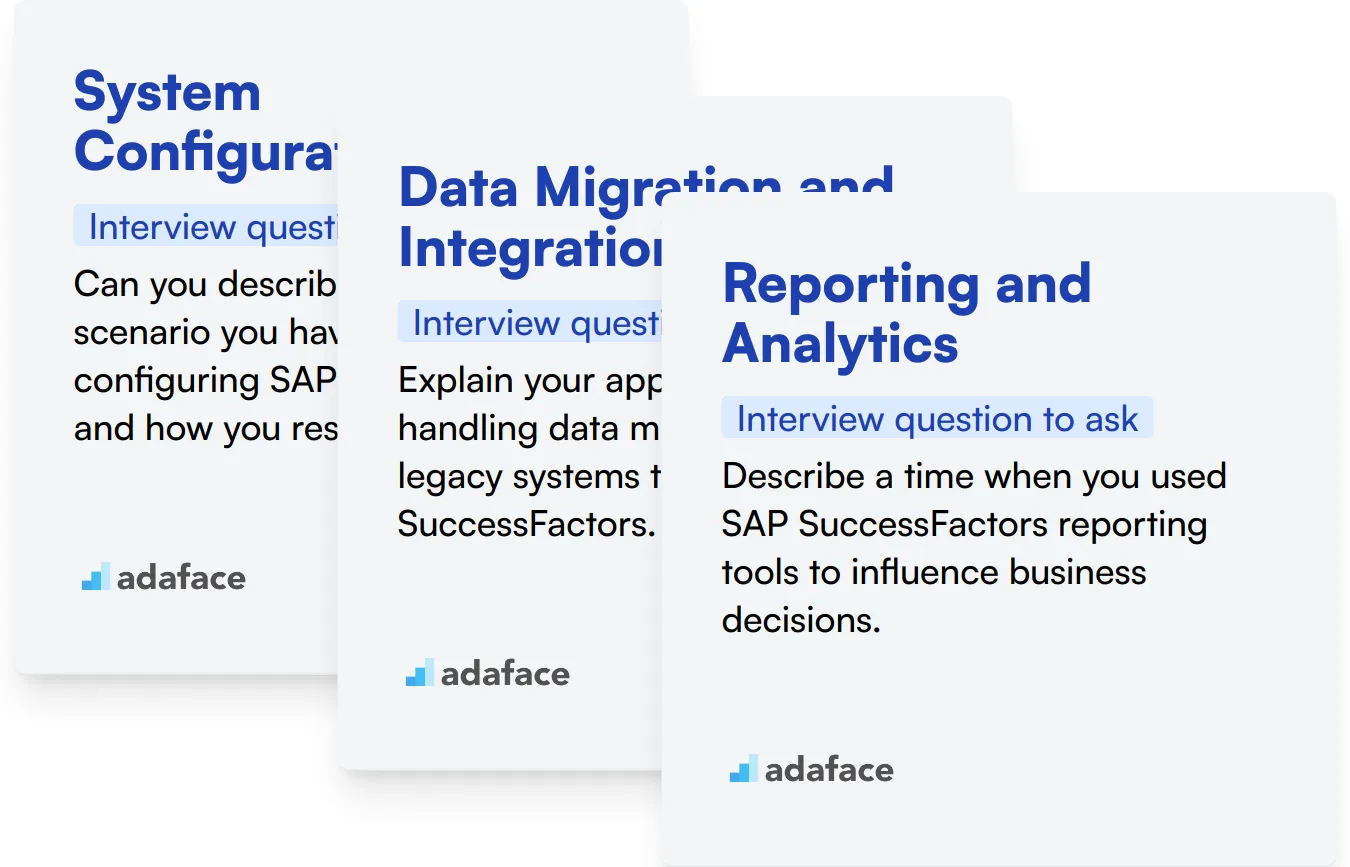
System Configuration
System configuration is the backbone of managing SAP SuccessFactors effectively, ensuring that the HR solution aligns perfectly with organizational policies and processes. It requires a deep understanding of both the software itself and the specific HR needs of the company.
To effectively screen for expertise in system configuration, consider incorporating a series of relevant MCQs. Adaface offers a tailored SAP SuccessFactors test designed to evaluate this skill.
In addition to tests, direct questioning can further help assess a candidate's practical knowledge in configuring SAP SuccessFactors.
Can you describe a complex scenario you have faced while configuring SAP SuccessFactors, and how you resolved it?
Look for detailed descriptions of specific challenges the candidate encountered, the steps they took to overcome them, and how their actions aligned with broader business objectives.
Data Migration and Integration
Data migration and integration are critical when implementing or upgrading SAP SuccessFactors, requiring meticulous attention to ensure data accuracy and system functionality across integrated platforms.
You might consider an assessment test focusing on these skills to initially evaluate candidates’ abilities in a controlled environment.
Probing into their practical experience through targeted questions can also provide deeper insights into their expertise.
Explain your approach to handling data migration from legacy systems to SAP SuccessFactors.
The answer should outline a clear, methodical approach to data migration, emphasizing data integrity, security measures, and adaptation to potential challenges.
Reporting and Analytics
Proficiency in reporting and analytics within SAP SuccessFactors is essential for generating actionable insights from HR data, helping organizations make informed decisions about their workforce.
An assessment containing specific MCQs on this topic can serve as a good preliminary filter. Adaface offers a variety of tests that can be used to assess these analytical skills.
Asking candidates to elaborate on their experiences with analytics in SAP SuccessFactors can also be revealing.
Describe a time when you used SAP SuccessFactors reporting tools to influence business decisions.
Effective responses should include examples of extracting and utilizing HR data to solve problems or optimize processes, showcasing the candidate’s strategic use of analytics.
Optimize Your Hiring Process with SAP SuccessFactors Skills Tests and Targeted Interview Questions
When looking to hire professionals skilled in SAP SuccessFactors, verifying their competencies accurately is imperative. This ensures that candidates possess the necessary knowledge and capabilities for the role.
The most reliable way to assess these skills is through tailored skills tests. Adaface offers a comprehensive SAP SuccessFactors test designed to evaluate candidates' expertise effectively.
After utilizing the skills tests from Adaface, you can efficiently shortlist the top candidates. These candidates can then be invited for interviews where their practical knowledge and application of SAP SuccessFactors can be further assessed.
Ready to enhance your recruitment process? Visit our dashboard to get started, or explore our full range of tests and services on our test library page.
SAP SF Test
Download SAP SuccessFactors interview questions template in multiple formats
SAP SuccessFactors Interview Questions FAQs
This guide covers basic, junior, intermediate, process-related, integration-focused, and situational SAP SuccessFactors interview questions for different experience levels.
These questions help assess candidates' knowledge, skills, and experience with SAP SuccessFactors, allowing recruiters to make informed hiring decisions.
Yes, the guide includes sample answers for many of the questions to help interviewers evaluate candidates' responses effectively.
Absolutely. The questions are designed to assess various aspects of SAP SuccessFactors knowledge, making them suitable for different HR roles involving the platform.

40 min skill tests.
No trick questions.
Accurate shortlisting.
We make it easy for you to find the best candidates in your pipeline with a 40 min skills test.
Try for freeRelated posts
Free resources




